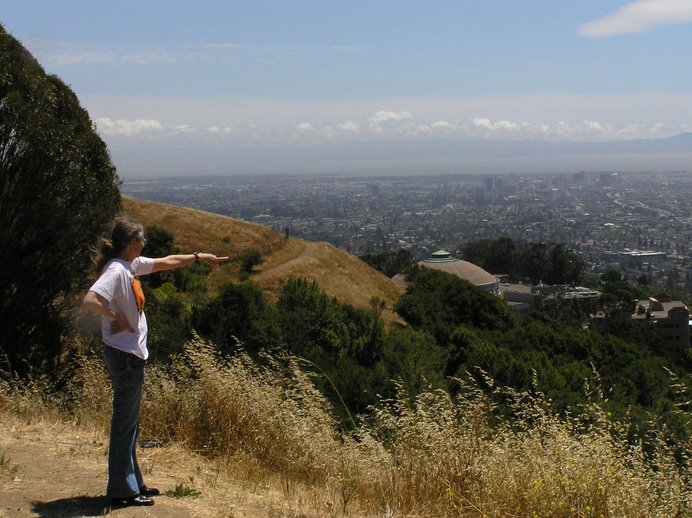Muslim cabbies change course of woman's life: Berkeley legal assistant converts to Islam, plans journey to Afghanistan
By Kristin Bender, STAFF WRITER, Oakland Tribune
BERKELEY — As a legal assistant in a law firm representing East Bay taxi drivers, Jane Stillwater built friendships with many Afghans who drive cabs locally. She found them warm and hardworking, kind and unassuming.
Stillwater, a free-spirited woman who has lived in Berkeley for 40 years, felt at home among her new friends. Slowly, she also started learning about their faith and, after years of research and study, she converted to Islam a year ago.
"I figured it would be the one thing that I could do that would really (upset) President [sic] George Bush," she said with a slight laugh.
In all seriousness, she said she accepted the faith because it meshed with her core belief that life is about trying to be a good person. "The way I look at it ... life is a competition. The winners are the ones who do the most good deeds," the 63-year-old said.
Now, Stillwater is trying to raise money to do some good deeds in Afghanistan. This summer, she hopes to take a "reality tour" of the country and support people in their reconstruction and peace-building efforts.
On the tour, participants will deliver humanitarian aid to Afghan schools, hospitals, orphanages and refugee camps. They will visit with women at Kabul University to learn about their hopes and challenges. They will meet with landmine awareness groups and talk with journalists about efforts to createan independent press.
"I want to make America aware of what is going on in Afghanistan," she said.
Stillwater, who has written a blog (http://jpstillwater.blogspot.com) for about 600 on her distribution list since 2000, plans to post her story when she returns. "I would report the bad stuff and also the good," she said. "The American way is not prison and bombs. The American way is freedom and democracy, and that is not what came to Afghanistan."
Stillwater's interest in the country started while working for 15 years as a legal assistant in a law office that represented taxi drivers. "I got to know many Afghans and (heard) their stories. People who used to be doctors and lawyers and even princes in Afghanistan were now driving cabs in America. But that didn't bother them. They were glad to be here in America, safe and employed."
But Stillwater could see the trouble in her new friends' eyes.
"What did bother them was that their country, which had been almost reduced to rubble during battles with the USSR in the 1980s, was now being even further degraded and destroyed by the American occupation," she said.
They'd ask Stillwater, who came to Berkeley in 1966 and has a master's degree from the University of California, Berkeley, if she could help them. "They'd beg me, 'Please do it.' It pained them to their very core to see what has happened to their former homeland," she said.
Stillwater wanted to know more.
"They made me want to go see Afghanistan for myself, just to see the kind of country that could produce such kind and generous people even in the face of such adversity."
One of the cab drivers Stillwater met was Wahid Aslami, the chief representative for the East Bay Taxi Drivers Association. Aslami left Afghanistan at age 14, but visited the country in 2004 and plans to take his 9-year-old son back this summer. "When I went back to Afghanistan (in 2004) the changes were so drastic that it broke my heart," he said.
Aslami said warlords ran most of the country outside of Kabul and drugs were everywhere. Children were being kidnapped and killed for their organs. Just two years ago, 40 bodies were found stuffed down an old well, and all the dead children had their kidneys removed. Young girls were being snatched off the streets and sold into prostitution, he said.
Although Aslami said he believes things have improved in the northern part of the country since the fall of the Taliban, there is still much violence and unrest in the southern portion of the country. "When the Northern Alliance committed themselves to the new government, much of the heavy fighting and checkpoints were diminished. Life became better for the people. Where we are seeing the incidents are in southern Afghanistan. To that end, he commended Stillwater for her courage and desire to help his people.
"She is really excited to go there to observe firsthand and see what is going on and to see if she could be of help to any organization, which we really deeply appreciate," he said.
Because Stillwater will travel with the nonprofit organization Global Exchange on its ["Voices against Poverty"] tour, she will not be alone on the trip, which is from June 18-28. Tour organizers say the goal is to enhance "understanding of Islam and Afghan culture as well as the role the Afghan people want (Americans) to play in building lasting peace in Afghanistan."
Although Stillwater said she is not concerned for her safety, there are risks. Four years after the fall of the Taliban, violence continues in Afghanistan, according to Amnesty International, which is particularly concerned about reports of attacks on civilians by anti-government forces in recent months.
Stillwater, who said she lives in low-income housing and eats a lot of peanut butter-and-jelly sandwiches, is currently trying to raise at least $3,500 for the trip. She is collecting donations outside the Grand Lake Theater, where owner Allen Michaan often posts anti-war messages on the marquee.
She has only collected $37, but she isn't deterred. "I don't expect that I will get anything out of this, but I can't not try. Even if I don't raise a cent, hopefully I will make someone aware that there are problems there and they are big ones."
To donate to Stillwater, send an e-mail to jpstillwater@yahoo.com or call her at 843-0581.
skip to main |
skip to sidebar


Jane Stillwater is a freelance journalist, war correspondent, blogger, political Cassandra and author. Her latest motto is "Stop Wall Street, War Street, Big Pharma and Big Tech from destroying our world."

Blog Archive
-
▼
2006
(148)
-
▼
April
(12)
- Home invasion: Why haven't cops taken the White Ho...
- American Inventor: Inventing yet another way to sa...
- Dracula had family values too: The Republican 2006...
- How to break into prime-time news: An effective me...
- Antiques Roadshow: My adventures with receiving So...
- Madame Jane predicts: The Fall of the House of Bus...
- Better than casinos: South Dakota's legal abortion...
- Muslim cabbies change course of woman's life: Ber...
- The War Lover: The US has never been invaded but w...
- No Social Security, unemployment benefits or choco...
- The War at Home: How to make war on America withou...
- My 15 minutes of fame: Auditioning to be on "The A...
-
▼
April
(12)
